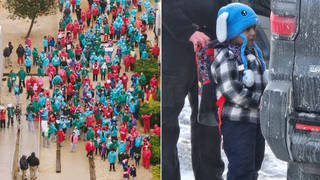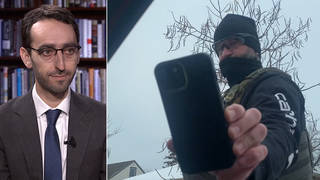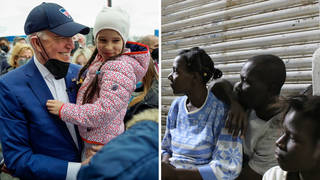
A federal judge stopped the Trump administration from illegally deporting as many as 700 Guatemalan children over the Labor Day weekend, ordering a last-minute block on their removals even as some children had already been boarded onto planes. The National Immigration Law Center filed an emergency request to stop the deportation flights, arguing that the children would face harm and abuse if they were returned to Guatemala. The children arrived in the United States as unaccompanied minors, and many are now living in shelters or foster care. The Trump administration insists it is acting at the request of the children’s families and the government of Guatemala.
“There are protections for unaccompanied minors that provide how a child can be released from custody, to whom, and the process if they want to go back to their country,” says Efrén Olivares, an attorney representing Guatemalan unaccompanied minors. “If this were a benign repatriation to send children back to their parents, it wouldn’t be happening at midnight on Sunday of Labor Day weekend.”
Transcript
AMY GOODMAN: This is Democracy Now!, democracynow.org, The War and Peace Report. I’m Amy Goodman, with Juan González.
We turn now to the Trump administration’s attempt to illegally deport as many as 700 Guatemalan children in the dead of night over Labor Day weekend. The move was temporarily halted at the last minute by a federal judge. The National Immigration Law Center filed an emergency request to stop the deportation flights, arguing the children, who arrived in the U.S. without their parents, would face harm and abuse if they were returned to Guatemala. Many of the children are now living in shelters and foster care. One 10-year-old said in a court filing, quote, “I do not have any family in Guatemala that can take good care of me.” A 16-year-old said she faced, quote, “threats against my life” in Guatemala, saying, “If I am sent back, I believe I will be in danger,” unquote.
Over the weekend, some of the kids were loaded onto planes that waited on the tarmac in South Texas. U.S. District Judge Sparkle Sooknanan said she was awakened at 2:35 a.m. to address an emergency filing from the children’s lawyers, who warned the flights might leave within hours. The judge held a hearing Sunday, saying, quote, “I have the government attempting to remove minor children from the country in the wee hours of the morning on a holiday weekend, which is surprising,” she said.
This all comes as the Trump administration insists it’s reuniting the Guatemalan children, at their country’s request, with their families, who sought their return. On Monday, Guatemala’s president said his country is ready to receive the unaccompanied children.
For more, we’re joined from McAllen, Texas, near the U.S.-Mexico border, by Efrén Olivares, an attorney representing the Guatemalan children. He’s vice president of litigation at the National Immigration Law Center.
Efrén, welcome back to Democracy Now! Explain exactly what took place. I mean, this is so dramatic. Over a holiday weekend, in the middle of the night, a judge is woken up at 2:35 in the morning. Explain here what’s at stake.
EFRÉN OLIVARES: Thank you. Good morning. Thanks for having me.
That’s exactly right. We started hearing rumors that there were plans to remove Guatemalan children in ORR custody, in the custody of the Office of Refugee Resettlement. These are unaccompanied children who do not have a parent or a guardian with them. And we started putting together a challenge to try to stop it, because that is unlawful. There are laws. There are protections for unaccompanied minors that provide how a child can be released from custody, to whom, and the process if they want to go back to their country. There are very well-established process that have been in place since at least 2008, with bipartisan support.
And the later in the day — keep in mind, this Saturday of Labor Day weekend. So, the later in the day, the more and more information we were getting that there were plans to pick up the children. So, after 11:00, the shelters received a notification from headquarters of the Office of Refugee Resettlement to have their children ready within two hours or four hours for pickup. If this were a benign repatriation to send children back to their parents, it wouldn’t be happening at midnight on Sunday of Labor Day weekend. So, we filed that that lawsuit at around 1:00 in the morning, and a temporary restraining order simultaneously, and then followed the court’s emergency procedure, calling the court at 2:00. Somebody got a hold of a judge at 2:30. And that’s how we ended up here.
JUAN GONZÁLEZ: And could you — Efrén, could you explain the Trafficking Victims Protection and Reauthorization Act, which was, I think, central to your argument to the court?
EFRÉN OLIVARES: Exactly. That is precisely the law, passed in 2008 with widespread bipartisan support, that protects unaccompanied minors. And the idea behind that law is that young immigrant children who come to the U.S. without a parent, or without either parent, are very susceptible to exploitation, trafficking. So, in order to protect those children from that, there are very clearly established processes. For example, if an adult requests what is called voluntary departure, they can return to their home country. If a child returns — requests voluntary departure, an immigration judge has to approve that. A child advocate has to make a best interest determination to ensure that returning the child is in the best interest of the child, does not place the child in danger. The child is what is called of a tender age. There’s additional protections, so that an assessment can be made, presented to the immigration judge, and only then does the judge allow that to go forward. And then there are procedures also to make sure that there’s somebody back home to receive the children, a proper adult or government authorities.
This does not happen in the middle of the night, in a rush, without informing anyone. Poor children, right? They were woken up in the middle of the night, put on a bus, taken to the airport, and were there for hours, not knowing what was going to happen to them. Luckily, the children were not unlawfully deported. We have 14 days to properly look at the situation and then determine the next steps.
JUAN GONZÁLEZ: And where are these children now? Were they returned to the shelters where they were being held?
EFRÉN OLIVARES: They were. All the children who were on those planes are now back in ORR custody, according to the government. That’s what the government has reported, and we have confirmed as much.
AMY GOODMAN: And, Efrén Olivares, can you give us a more complete description of who these kids are, where they are throughout the United States?
EFRÉN OLIVARES: We have plaintiffs in Texas, in California, Pennsylvania, New York. And the class is nationwide of all unaccompanied Guatemalan children in ORR custody. They are in shelters all over the country — right? — Florida, Louisiana, Nevada, Arizona, there’s Chicago — all over the country, as this happens, right? That is normal. And they vary in age from at least 7 to 17. Some arrived a couple of months ago, this summer. Some arrived longer than that, a few months ago, and they have been in ORR custody since then.
The vast majority of them have pending immigration cases. They have open immigration cases. An immigration judge has not determined their claims. Some are eligible for asylum. Some are eligible for what’s called a special immigrant juvenile visa. That’s when reunification with one or both parents is not possible. So, it just varies a lot. The one common denominator here is twofold: They are all children, and they are Guatemalan.
AMY GOODMAN: And your response to the Guatemalan president, Arévalo, saying that they’re welcome to come back to Guatemala, what the children are saying about returning, and whose custody they’re in right now in the United States?
EFRÉN OLIVARES: They are currently in the custody of the Office of Refugee Resettlement, which is a federal agency, part of the Department of Health and Human Services. That is where they are supposed to be as unaccompanied minors.
The Guatemalan government updated their statement to specify that they welcome any children who want to return. And some of the children may want to return, and there are processes to be followed in order to do that orderly — not in the middle of the night over a holiday weekend without proper notice. There are processes. And that’s what we’re asking the court: require the government to follow the process required by law. Nothing more. The law is there, has been there for 20 years. Let’s just follow the law, follow the normal process. And once that happens, there’s no problem if a child is returned, right?
But some children, keep in mind, have asylum claims. They fear persecution in Guatemala, right? So some children do not want to return. And not only do they not want to return, they fear returning, because their life, their personal safety, is in danger. So, it is not true that all the children want to return.
AMY GOODMAN: Efrén Olivares, I want to thank you so much for being with us, attorney representing the unaccompanied Guatemalan children, many of whom President Trump has attempted to have deported this past weekend, Labor Day weekend, in the middle of the night. Efrén Olivares is vice president of litigation at the National Immigration Law Center, previously with the Southern Poverty Law Center’s Immigrant Justice Program. His book, My Boy Will Die of Sorrow: A Memoir of Immigration from the Front Lines. He was speaking to us from the U.S.-Mexico border in McAllen, Texas.
This is Democracy Now! When we come back, we look at the Israeli airstrike in Yemen that killed Yemen’s Houthi prime minister, defense minister and other officials, and we’ll talk about Gaza, with Rami Khouri. Stay with us.
[break]
AMY GOODMAN: “Jaano Jot” by Sonny Singh, performing in our Democracy Now! studio.













Media Options